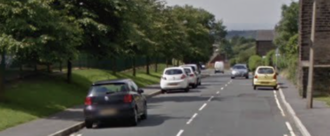-
WE WANT BIG BUSES TO BE ENROUNTING WOOLICH TO BELMASHBecause its for the benefits of we without cars .10 of 100 SignaturesCreated by Joy Odigie
-
Lets save the country and get renawable power now.It is up to everyone to join this campaign. if you have panels you know what they can do, if you haven`t, you are missing out. It`s a no-brainer really, with a hot water cylinder you can have free hot water for most on the year. In around 2015 a report said that photovoltaic panels on the rooftops of private houses has out performed the coal fired power stations. Not long after Boris was PM another report said panels on domestic roofs had out performed all other methods, including nuclear for energy generartion. I wrote to Boris and the then energy minister but nothing came of it. Now we need clean, own generated energy. It`s time for the public to join this cause and tell the energy minister and the wider Government where they should be putting our hard earned tax money. Please support this campaign, it does make sense.5 of 100 SignaturesCreated by Martin Garside
-
Benefit changesBecause so many families with young children are struggling ,They might use food banks ,but the food never lasts ,something needs to be done9 of 100 SignaturesCreated by Aileen Fletcher
-
Get Boris Johnson outJohnson and Rishi Sunak are both Liars saying they never attended parties and yet they did7 of 100 SignaturesCreated by Freddy Haycock
-
Protect Clayton Road and Stour Close from Traffic ChaosWe have to move quickly to prevent Persimmon Homes from going ahead with this request. The additional traffic along our already congested residential roads will lead to further congestion and the potential for more accidents. We see this as an attempt by Persimmon Homes to overturn the planning condition to build the access via a new roundabout on the A120.167 of 200 SignaturesCreated by Stephen Wright
-
“CLEAN" ENERGY TECHNOLOGY PARK IS A NUCLEAR NIGHTMARE“Clean” Energy Security? The raw material for nuclear is uranium which can be found in in the UK in the Orkneys but which our government buys from, for example Kazakhstan where it is largely mined by leaching out the uranium from the rock using massive amounts of fresh water and chemicals. “Clean” Carbon footprint? Nuclear is at least the third highest carbon emitter after coal-fired plants and natural gas. As uranium becomes more scarce more energy and chemicals are needed to get the uranium out of the ground. The Nuclear Decommissioning Authority have calculated their carbon footprint for 2019/20 as 1,046,950 tonnes of carbon dioxide equivalent (CO2e). This does not include operation of nuclear reactors or include the building of Hinkley Point C with the biggest pour of concrete in the UK ever. The nuclear and fossil fuel industry are mutually intertwined. The biggest gas plant being constructed in the UK right now is at Sellafield, home to 80 percent of the UK's existing nuclear waste which needs to be kept cool. The heating effect of discharges to the atmosphere and sea and also the use of water as a coolant for reactors and nuclear wastes are all contributing to ocean temperature rise and climate change. An honest description of Nuclear would be : Radioactive Fossil Fuel by proxy. “Clean” Radioactive Emissions Radioactive emissions occur at every stage of the nuclear fuel cycle from the mining of uranium to enrichment, to fuel manufacture, to operation of the reactors, to the “disposal” of nuclear wastes. These emissions occur both routinely and accidentally and have already resulted in large swathes of the world’s land and oceans becoming irreversibly polluted with man-made radioactive isotopes. "Clean" and Healthy? Radiation can damage the DNA in our cells. High doses of radiation can cause Acute Radiation Syndrome or Cutaneous Radiation Injuries. There is no such thing as a “safe dose” of radiation The “Clean Energy Technology Park” just 3.9 miles from the centre of Preston is planning an incinerator to burn intermediate level radioactive wastes from across Europe. This would result in daily plumes of chemical and radio-toxic airborne fine particle emissions blowing accross Preston City Centre. We call for the word “Clean” to be replaced by - Nuclear - at the "Clean Energy Technology Park".231 of 300 SignaturesCreated by Marianne Birkby
-
SAVE OUR TWO LOCKS GEESEThese geese are social creatures who have been used to living alongside people and other waterfowl companions. The Council have not confirmed where they have been placed & we are unable to determine that it is an appropriate & safe place.1,051 of 2,000 SignaturesCreated by Elizabeth Haynes
-
Protect Vicary's Mills and LeatWe have lost huge amounts of history over the last several decades. Newton Abbot is a thriving market town with 800 years of market history. The Mills are a substantial part of this. They employed hundreds of people during the Industrial Revolution. We must protect and restore these impressive buildings and medieval leat. As shown by the alternative proposals, the site can be converted and brought fully to life, with a greater number of homes than the current planning application. Demolition will also release countless tonnes of carbon into the atmosphere, which along with mass construction is a highly damaging and backwards step in a time of climate crisis.600 of 800 SignaturesCreated by Newton Abbot & District Civic Society
-
Stop Mary Ball’s Death Mask and Coventry police exhibits being lost to Birmingham.These exhibits need to be put on display in the city they relate too. These belong to the city and not the county. Should they be moved away from coventry they will likely never return as a whole.612 of 800 SignaturesCreated by Peter Garbett
-
Save the No 7 bus route for Hoath and surrounding villages - Save the school bus to Spires AcademyPlease sign this petition if you are affected by the loss of the No 7 bus service and the Spires School Service and let Matthew Arnold at Stagecoach Kent know why he needs to reinstate these bus routes. This decision affects residents in Beltinge, Reculver, Hillborough, Castle Chase, Maypole, Knaves Ash, Hoath, Sturry and Broad Oak. We may only be small communities but our need for this bus route is vital to the health and wellbeing of all residents.1,028 of 2,000 SignaturesCreated by Karen Johncock
-
Speed preventions on Cooper Street SpringheadLet’s try to get some measures in place on this Street to keep our families and community safer.472 of 500 SignaturesCreated by Rachel Cunnane
-
Stop the closure of Budhmor Residential Home in Portree, Isle of SkyeIsle of Skye does not have a lot of spaces available for old people to be cared for. At the moment Home Farm has 17 residents and if the 15 residents from Budhmor are homed there it will leave only space for 3 more residents from the whole island. The staff are being made redundant at a time when the economy on the island is at an all time low.370 of 400 SignaturesCreated by Cameron Gauld
Hello! We use cookies to improve your experience by providing insights into how the site is being used. Find out more.












